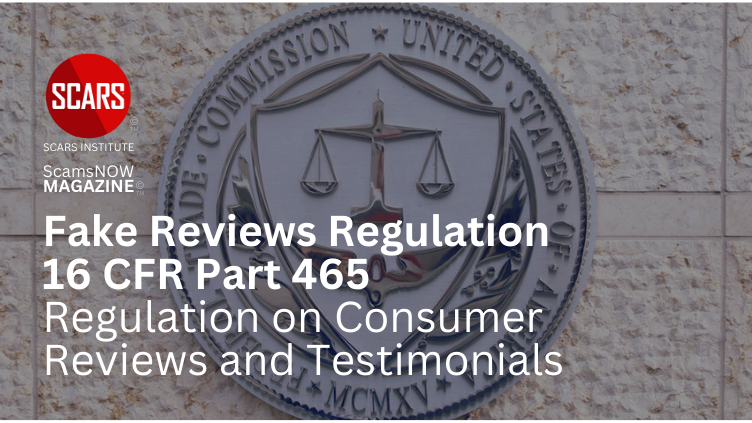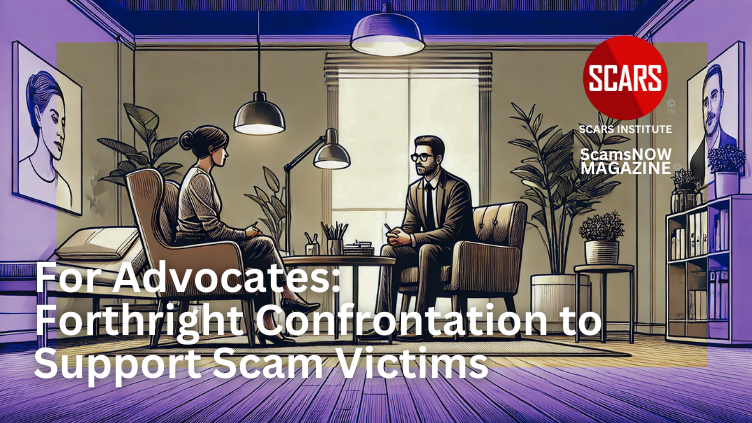For Advocates: Using Forthright Confrontation to Support Scam Victims
Forthright Confrontation is a Communication Method Victims’ Services Providers and Advocates can use to Support Traumatized Scam Victims
Primary Category: Scam Victim Recovery Psychology
Author:
• Tim McGuinness, Ph.D. – Anthropologist, Scientist, Director of the Society of Citizens Against Relationship Scams Inc.
• Portions based on the work by Dr. Jordan B. Peterson
About This Article
Forthright confrontation is a direct communication strategy that allows victims’ service providers and advocates to address difficult issues head-on, while still maintaining empathy and support.
This approach, emphasized by figures like Jordan B. Peterson, helps scam victims confront feelings of shame, guilt, or denial by clearly presenting the reality of their situation without avoiding tough conversations.
It encourages victims to face the trauma they’ve experienced, acknowledge it, and take active steps toward recovery. When used with care, forthright confrontation empowers victims to reclaim control over their lives by breaking through emotional barriers and fostering personal growth.

Forthright Confrontation is a Communication Method Victims’ Services Providers and Advocates can use to Support Traumatized Scam Victims
What is Forthright Confrontation?
Forthright confrontation is a communication strategy where someone addresses an issue, concern, or conflict in a direct, honest, and assertive manner.
The goal is to clearly present the problem or point of disagreement without sugarcoating or avoiding the issue while maintaining respect and fairness in the conversation. This approach emphasizes openness, transparency, and taking responsibility for one’s feelings and perspectives while encouraging the other party to do the same. It has been promoted by Dr. Jordan B. Perterson.
In forthright confrontation, the person engaging in this style of communication aims to resolve a conflict or clarify misunderstandings by bringing the issue to the forefront, ensuring that it is addressed and not ignored or swept under the rug. It is often used in conflict resolution, therapy, leadership, or personal relationships to promote honesty and foster a solution-oriented environment. In this way, it is an important part of the ‘exposure’ process to help scam victims-survivors face their issues head-on.
While forthright confrontation can be effective in resolving issues, it requires careful handling to avoid coming across as aggressive or insensitive. The key is balancing directness with empathy, ensuring that the conversation remains constructive.
Using Forthright Confrontation
Using forthright confrontation to support traumatized scam victims can be a delicate but effective approach when handled with care and empathy. Here’s how it can be applied:
Establish Trust and Empathy
Before engaging in forthright confrontation, it’s crucial to build a foundation of trust. Scam victims often feel shame, guilt, or isolation due to the nature of the exploitation. Ensure that they feel understood and supported. This includes affirming their experience and emotions without judgment.
Example:
“I know that what you went through was incredibly painful, and it’s understandable to feel angry or ashamed. It’s important to address these feelings openly, and I’m here to support you.”
Clearly & Directly Address the Issue
Once trust is established, gently but directly confront the victim’s behaviors or beliefs that may be impeding their healing process. For example, victims may blame themselves for being scammed or may be stuck in denial about the level of manipulation they experienced. Forthright confrontation would involve challenging these thoughts with facts and empathy.
Example:
“I hear you when you say that you should have known better, but I need to tell you that scammers are professionals at deception. This isn’t your fault, and we need to focus on how you were exploited rather than what you could have done differently.”
Use Constructive Dialogue
During forthright confrontation, the goal is to encourage personal growth and healing without furthering their trauma. Confronting them with kindness involves highlighting unhealthy patterns or thought processes, while simultaneously offering solutions or alternative perspectives.
Example:
“I see that you keep replaying the scenario in your head, thinking you should have spotted the red flags. It’s important to stop punishing yourself for this. Can we work together to understand the real responsibility lies with the scammer, not with you?”
Guide Towards Actionable Steps
Support the victim in moving forward by guiding them to take actionable steps for recovery. Forthright confrontation can involve addressing avoidance or reluctance to seek help and encourage them to engage with resources like therapy, support groups, or law enforcement.
Example:
“I understand you’re hesitant to talk to a counselor about this, but confronting these feelings head-on can help you heal. It’s not about reliving the past; it’s about reclaiming your future.”
Encourage Self-Empowerment
The ultimate goal of forthright confrontation in this context is to empower scam victims. Remind them of their strength and capacity to recover, while also offering them the tools and resources they need to regain control over their lives.
Example:
“I know it’s difficult right now, but by acknowledging what happened and confronting it, you’re already showing strength. Let’s work on rebuilding your trust in yourself step by step.”
A Review
Forthright confrontation, as often discussed by Jordan B. Peterson, refers to the process of directly and honestly addressing issues or conflicts, without avoiding or minimizing them. According to Peterson, it is essential for personal growth and establishing genuine relationships, as it involves speaking the truth, even when uncomfortable, to clarify misunderstandings and resolve deeper issues.
In forthright confrontation, you confront the problem or the person directly, with a focus on honesty and clarity rather than passive-aggressiveness or avoidance. Peterson emphasizes that this approach not only helps in resolving conflicts but also builds strength, resilience, and a deeper understanding of oneself and others. It allows individuals to negotiate for what they want, set boundaries, and articulate their needs without resorting to manipulation or deceit.
One of Peterson’s key messages about forthright confrontation is that by addressing issues head-on, people avoid the buildup of resentment and the festering of unresolved problems. For example, he suggests that in relationships, small unresolved conflicts can snowball into larger, more unmanageable problems over time if not confronted early and with honesty. Forthright confrontation demands courage, as it often requires facing uncomfortable truths and potential conflict, but it ultimately leads to more authentic interactions and stronger, more meaningful relationships.
Peterson encourages individuals to articulate their thoughts clearly and directly, rather than concealing their true feelings or being indirect. He views this as a way to promote genuine dialogue, where both parties can express their positions and negotiate solutions that are in everyone’s best interest. Forthright confrontation, according to Peterson, is part of living truthfully and courageously, and it enables both personal integrity and the creation of stronger societal bonds.
In his book 12 Rules for Life: An Antidote to Chaos, Peterson discusses the importance of speaking honestly and confronting difficult situations rather than avoiding them, which is integral to his views on forthright confrontation.
- RULE 1 / Stand up straight with your shoulders back
- RULE 2 / Treat yourself like someone you are responsible for helping
- RULE 3 / Make friends with people who want the best for you
- RULE 4 / Compare yourself to who you were yesterday, not to who someone else is today
- RULE 5 / Do not let your children do anything that makes you dislike them
- RULE 6 / Set your house in perfect order before you criticize the world
- RULE 7 / Pursue what is meaningful (not what is expedient)
- RULE 8 / Tell the truth—or, at least, don’t lie
- RULE 9 / Assume that the person you are listening to might know something you don’t
- RULE 10 / Be precise in your speech
- RULE 11 / Do not bother children when they are skateboarding
- RULE 12 / Pet a cat when you encounter one on the street
Summary
Forthright confrontation is a communication strategy that can be particularly useful for advocates and service providers working with traumatized scam victims. It involves addressing issues directly and honestly, with the goal of promoting clarity and resolution. When applied to supporting scam victims, this approach allows them to confront feelings of guilt, shame, or denial while emphasizing personal responsibility and self-empowerment. Rooted in the teachings of figures like Jordan B. Peterson, forthright confrontation fosters an environment of transparency, helping victims face difficult truths and aiding them in their healing process.
This method is effective when used with empathy, ensuring that the victim feels heard and supported while being gently challenged to move past emotional barriers. By promoting open dialogue and challenging harmful thought patterns, service providers can help victims break free from self-blame and encourage healthier coping mechanisms. Ultimately, forthright confrontation, when used with compassion, provides scam victims with the tools they need to regain control over their lives and begin their recovery journey.
-/ 30 /-
What do you think about this?
Please share your thoughts in a comment below!
Statement About Victim Blaming
SCARS Institute articles examine different aspects of the scam victim experience, as well as those who may have been secondary victims. This work focuses on understanding victimization through the science of victimology, including common psychological and behavioral responses. The purpose is to help victims and survivors understand why these crimes occurred, reduce shame and self-blame, strengthen recovery programs and victim opportunities, and lower the risk of future victimization.
At times, these discussions may sound uncomfortable, overwhelming, or may be mistaken for blame. They are not. Scam victims are never blamed. Our goal is to explain the mechanisms of deception and the human responses that scammers exploit, and the processes that occur after the scam ends, so victims can better understand what happened to them and why it felt convincing at the time, and what the path looks like going forward.
Articles that address the psychology, neurology, physiology, and other characteristics of scams and the victim experience recognize that all people share cognitive and emotional traits that can be manipulated under the right conditions. These characteristics are not flaws. They are normal human functions that criminals deliberately exploit. Victims typically have little awareness of these mechanisms while a scam is unfolding and a very limited ability to control them. Awareness often comes only after the harm has occurred.
By explaining these processes, these articles help victims make sense of their experiences, understand common post-scam reactions, and identify ways to protect themselves moving forward. This knowledge supports recovery by replacing confusion and self-blame with clarity, context, and self-compassion.
Additional educational material on these topics is available at ScamPsychology.org – ScamsNOW.com and other SCARS Institute websites.
-/ 30 /-
What do you think about this?
Please share your thoughts in a comment below!
Important Information for New Scam Victims
- Please visit www.ScamVictimsSupport.org – a SCARS Website for New Scam Victims & Sextortion Victims.
- SCARS Institute now offers its free, safe, and private Scam Survivor’s Support Community at www.SCARScommunity.org – this is not on a social media platform, it is our own safe & secure platform created by the SCARS Institute especially for scam victims & survivors.
- SCARS Institute now offers a free recovery learning program at www.SCARSeducation.org.
- Please visit www.ScamPsychology.org – to more fully understand the psychological concepts involved in scams and scam victim recovery.
If you are looking for local trauma counselors, please visit counseling.AgainstScams.org
If you need to speak with someone now, you can dial 988 or find phone numbers for crisis hotlines all around the world here: www.opencounseling.com/suicide-hotlines
Statement About Victim Blaming
Some of our articles discuss various aspects of victims. This is both about better understanding victims (the science of victimology) and their behaviors and psychology. This helps us to educate victims/survivors about why these crimes happened and not to blame themselves, better develop recovery programs, and help victims avoid scams in the future. At times, this may sound like blaming the victim, but it does not blame scam victims; we are simply explaining the hows and whys of the experience victims have.
These articles, about the Psychology of Scams or Victim Psychology – meaning that all humans have psychological or cognitive characteristics in common that can either be exploited or work against us – help us all to understand the unique challenges victims face before, during, and after scams, fraud, or cybercrimes. These sometimes talk about some of the vulnerabilities the scammers exploit. Victims rarely have control of them or are even aware of them, until something like a scam happens, and then they can learn how their mind works and how to overcome these mechanisms.
Articles like these help victims and others understand these processes and how to help prevent them from being exploited again or to help them recover more easily by understanding their post-scam behaviors. Learn more about the Psychology of Scams at www.ScamPsychology.org
SCARS INSTITUTE RESOURCES:
If You Have Been Victimized By A Scam Or Cybercrime
♦ If you are a victim of scams, go to www.ScamVictimsSupport.org for real knowledge and help
♦ SCARS Institute now offers its free, safe, and private Scam Survivor’s Support Community at www.SCARScommunity.org/register – this is not on a social media platform, it is our own safe & secure platform created by the SCARS Institute especially for scam victims & survivors.
♦ Enroll in SCARS Scam Survivor’s School now at www.SCARSeducation.org
♦ To report criminals, visit https://reporting.AgainstScams.org – we will NEVER give your data to money recovery companies like some do!
♦ Follow us and find our podcasts, webinars, and helpful videos on YouTube: https://www.youtube.com/@RomancescamsNowcom
♦ Learn about the Psychology of Scams at www.ScamPsychology.org
♦ Dig deeper into the reality of scams, fraud, and cybercrime at www.ScamsNOW.com and www.RomanceScamsNOW.com
♦ Scam Survivor’s Stories: www.ScamSurvivorStories.org
♦ For Scam Victim Advocates visit www.ScamVictimsAdvocates.org
♦ See more scammer photos on www.ScammerPhotos.com
You can also find the SCARS Institute’s knowledge and information on Facebook, Instagram, X, LinkedIn, and TruthSocial
Psychology Disclaimer:
All articles about psychology and the human brain on this website are for information & education only
The information provided in this and other SCARS articles are intended for educational and self-help purposes only and should not be construed as a substitute for professional therapy or counseling.
Note about Mindfulness: Mindfulness practices have the potential to create psychological distress for some individuals. Please consult a mental health professional or experienced meditation instructor for guidance should you encounter difficulties.
While any self-help techniques outlined herein may be beneficial for scam victims seeking to recover from their experience and move towards recovery, it is important to consult with a qualified mental health professional before initiating any course of action. Each individual’s experience and needs are unique, and what works for one person may not be suitable for another.
Additionally, any approach may not be appropriate for individuals with certain pre-existing mental health conditions or trauma histories. It is advisable to seek guidance from a licensed therapist or counselor who can provide personalized support, guidance, and treatment tailored to your specific needs.
If you are experiencing significant distress or emotional difficulties related to a scam or other traumatic event, please consult your doctor or mental health provider for appropriate care and support.
Also read our SCARS Institute Statement about Professional Care for Scam Victims – click here
If you are in crisis, feeling desperate, or in despair, please call 988 or your local crisis hotline – international numbers here.
More ScamsNOW.com Articles
A Question of Trust
At the SCARS Institute, we invite you to do your own research on the topics we speak about and publish. Our team investigates the subject being discussed, especially when it comes to understanding the scam victims-survivors’ experience. You can do Google searches, but in many cases, you will have to wade through scientific papers and studies. However, remember that biases and perspectives matter and influence the outcome. Regardless, we encourage you to explore these topics as thoroughly as you can for your own awareness.















![NavyLogo@4x-81[1] For Advocates: Using Forthright Confrontation to Support Scam Victims - 2024](https://scamsnow.com/wp-content/uploads/2025/04/NavyLogo@4x-811.png)










![scars-institute[1] For Advocates: Using Forthright Confrontation to Support Scam Victims - 2024](https://scamsnow.com/wp-content/uploads/2025/04/scars-institute1.png)

![niprc1.png1_-150×1501-1[1] For Advocates: Using Forthright Confrontation to Support Scam Victims - 2024](https://scamsnow.com/wp-content/uploads/2025/04/niprc1.png1_-150x1501-11.webp)